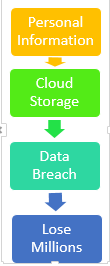Cyber Security: Protecting Your Investments
CREtech Blog
Data breaches are more and more common in today’s technological world, and the more we invest in cloud storage and mobile access the more we leave every company, large or small, vulnerable; just ask Target, Home Depot, or JP Morgan.
It may seem that the real estate industry wouldn’t be an attractive target to cyber criminals, however, with a growing reliance on creating, storing, and sharing personal and sensitive information, all in the digital sphere, we’re opening ourselves up to risks that were once non-existent. These aren’t just risks we’re taking for ourselves, no; our employees, vendors, and clients could all suffer potential losses if someone accessed their information.
It’s Happening All the Time
All information, mind you, that is highly coveted by criminals. Just to show you how serious these breaches are, here are just two of many that  happened in 2014.
happened in 2014.
In September 2014, Essex Property Trust Inc., reported that their computer networks had been breached. Essex, which controls 242 apartment communities with an additional 11 properties in various stages of development, had data stolen containing personal and proprietary information.
Early in the year, Pennsylvania Real Estate Investment Trust revealed that an unknown party gained access to their software managing their human resources, payroll, and benefit—most of which carried sensitive, personal information.
Fiscally Damaging
We’re all looking to save money and make money when and where we can. It’s a financial fact of life. But if you suffer a cyber-incident, especially on a large scale where data is lost, expect it to impact the bank account.
In fact, the average spending to repair data breaches [for all size companies] averaged out to be more than $8 million, according to privacy research organization Ponemon Institute. That number seems even more overwhelming when you consider that in 2011, U.S. businesses paid out nearly $200 for each individual record that was compromised.
Here’s a small list of expenses associated with a data breach:
- Investigative Costs
- Network/Sales Interruption
- Breach Disclosure Costs
- Legal Fees
- Identity Theft Monitoring
- Lawsuits
- Customers
The bottom line is that all real estate firms, either individual or proprietary, could suffer a data breach and lose personal or sensitive data. To protect yourself and any information you may be storing, it’s imperative that you comply with state and federal cybersecurity laws regarding your collecting and storage of this information.
